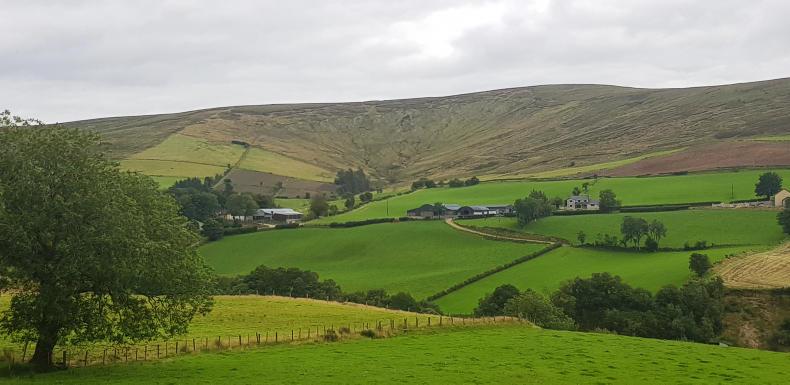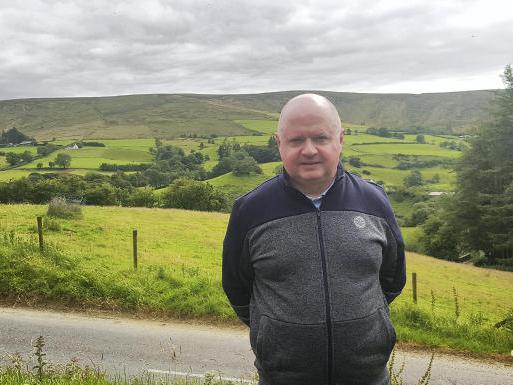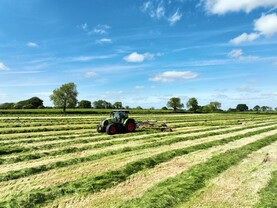Farmers in the northwest who were affected by floods and landslides in August 2017 have come under the spotlight again as the third anniversary of the unprecedented weather event approaches.
Costs associated with clearing deposited material, reseeding, erecting fences and replacing dead livestock ran into thousands of pounds for farmers around the Glenelly and Owenkillew rivers.
Listen to "Tyrone landslides three years on" on Spreaker.
“I had 10 acres beside the Glenelly river which was covered with clay and stones. It was up to 5ft deep in places,” said Cranagh sheep farmer Damian Carolan.
“In total, it took slightly less than £10,000 to get everything back to normal, but the land is still not as productive as it was, even after three years,” he said.
Carolan is part of group of local farmers who have made the case for financial support in meetings with politicians and senior government officials, including DAERA permanent secretary Denis McMahon and his predecessor Noel Lavery.

Uplands in the Glenelly and Owenkillew valleys are still marked from the landslides in 2017.
The farmers were told that an aid package could be made available, but the three-year absence of an executive at Stormont meant it could not be signed off and paid out.
By the time Edwin Poots became DAERA Minister in January 2020, most of the affected farmers had completed recovery work at their own expense and an aid package was no longer deemed “value for money” by civil servants.
Minister Poots can still proceed with delivering a package, but it would require “ministerial direction” as it now goes against the recommendation of his department officials.
“I continue to give that issue serious consideration. I haven’t made a decision. But it hasn’t gone away, and it is still on my mind,” Minister Poots said at the recent Ulster Farmers’ Union (UFU) AGM.
His concern is that the move could set a precedent for Stormont ministers to sign off money for other schemes which run against the advice of civil servants.
However, it is widely accepted that the only reason farmers in the Glenelly and Owenkillew valleys did not receive compensation was due to the Stormont stalemate.

Piles of silt and stones are common around the Glenelly and Owenkillew rivers as moving deposited material off farm was costly and required authorisation from NIEA.
Recently elected UFU president Victor Chestnutt has listed a financial aid package for the affected farmers as one of his priorities for his term in office.
He highlighted that farmers in Donegal who had land damaged by the same downpour received up to €15,000 from the Irish government within a few weeks.
Fencing scheme
DAERA did put up £500,000 of funding for affected farmers in NI through a fencing scheme administered through the Loughs Agency.
However, it took over two years for work to begin. Fences that were damaged by landslides away from watercourses were not eligible, and only barbed wire was used which made the fences unsuitable for enclosing sheep.
Damian Carolan points out that over 200 farmers in NI submitted force majeure forms for land that was made ineligible for area-based payments by the landslides and floods.
“Of that, there might be only 30 or 40 farmers who had excess expense running into several thousands of pounds. It would only cost the department a couple of hundred thousand to deliver a meaningful package,” he said.
Read more
40% of flooded land still ineligible in 2018
Fencing scheme stalled two years after floods
Farmers in the northwest who were affected by floods and landslides in August 2017 have come under the spotlight again as the third anniversary of the unprecedented weather event approaches.
Costs associated with clearing deposited material, reseeding, erecting fences and replacing dead livestock ran into thousands of pounds for farmers around the Glenelly and Owenkillew rivers.
Listen to "Tyrone landslides three years on" on Spreaker.
“I had 10 acres beside the Glenelly river which was covered with clay and stones. It was up to 5ft deep in places,” said Cranagh sheep farmer Damian Carolan.
“In total, it took slightly less than £10,000 to get everything back to normal, but the land is still not as productive as it was, even after three years,” he said.
Carolan is part of group of local farmers who have made the case for financial support in meetings with politicians and senior government officials, including DAERA permanent secretary Denis McMahon and his predecessor Noel Lavery.

Uplands in the Glenelly and Owenkillew valleys are still marked from the landslides in 2017.
The farmers were told that an aid package could be made available, but the three-year absence of an executive at Stormont meant it could not be signed off and paid out.
By the time Edwin Poots became DAERA Minister in January 2020, most of the affected farmers had completed recovery work at their own expense and an aid package was no longer deemed “value for money” by civil servants.
Minister Poots can still proceed with delivering a package, but it would require “ministerial direction” as it now goes against the recommendation of his department officials.
“I continue to give that issue serious consideration. I haven’t made a decision. But it hasn’t gone away, and it is still on my mind,” Minister Poots said at the recent Ulster Farmers’ Union (UFU) AGM.
His concern is that the move could set a precedent for Stormont ministers to sign off money for other schemes which run against the advice of civil servants.
However, it is widely accepted that the only reason farmers in the Glenelly and Owenkillew valleys did not receive compensation was due to the Stormont stalemate.

Piles of silt and stones are common around the Glenelly and Owenkillew rivers as moving deposited material off farm was costly and required authorisation from NIEA.
Recently elected UFU president Victor Chestnutt has listed a financial aid package for the affected farmers as one of his priorities for his term in office.
He highlighted that farmers in Donegal who had land damaged by the same downpour received up to €15,000 from the Irish government within a few weeks.
Fencing scheme
DAERA did put up £500,000 of funding for affected farmers in NI through a fencing scheme administered through the Loughs Agency.
However, it took over two years for work to begin. Fences that were damaged by landslides away from watercourses were not eligible, and only barbed wire was used which made the fences unsuitable for enclosing sheep.
Damian Carolan points out that over 200 farmers in NI submitted force majeure forms for land that was made ineligible for area-based payments by the landslides and floods.
“Of that, there might be only 30 or 40 farmers who had excess expense running into several thousands of pounds. It would only cost the department a couple of hundred thousand to deliver a meaningful package,” he said.
Read more
40% of flooded land still ineligible in 2018
Fencing scheme stalled two years after floods








 This is a subscriber-only article
This is a subscriber-only article










SHARING OPTIONS: